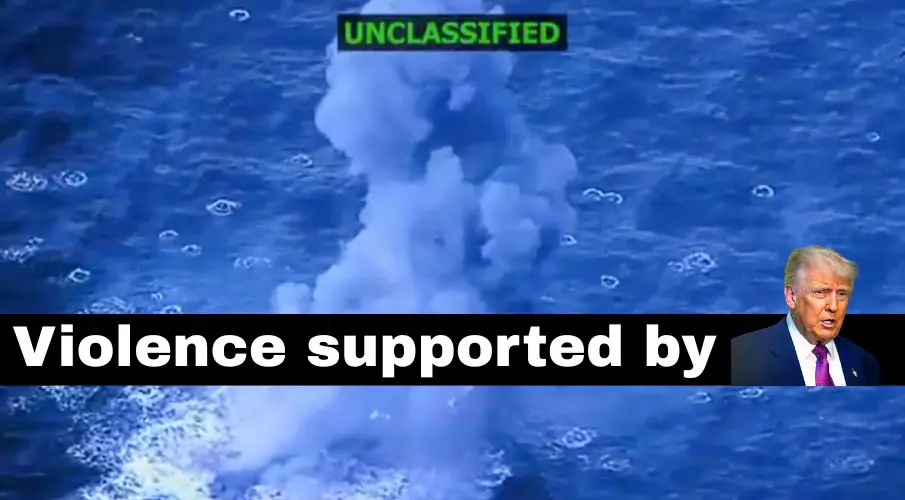Four men dead, a burning boat off the coast of Venezuela - and a U.S. government that spins a war narrative out of it. Defense Secretary Pete Hegseth declared on Friday that the strike had taken place in international waters, that the target had been transporting “substantial amounts of narcotics,” that the crew were “narco-terrorists.” But beyond these buzzwords there are no proofs, no names, no attribution. All that remains is a deadly explosion - and an administration that builds itself a “armed conflict” scenario in order to wage war without a mandate.
It was already the fourth strike of its kind since September. On September 2 the U.S. military reported the deaths of eleven people on a boat that Trump, in a social media post, attributed to the “Tren de Aragua” cartel. On September 15 and 19 further attacks followed, each with several dead, again without evidence who the victims were. With the latest strike on October 3 the toll adds up to at least 21 dead. No independent investigation, no forensic reports, no clarification. Instead, bodies are left behind in the sea - and the claim that Americans had been protected from a deadly threat.
President Trump declared the boat had carried enough drugs “to kill 25,000 to 50,000 people.” Proofs of that? None. Hegseth spoke of “confirmed intelligence” - but when senators asked in the Defense Committee this week, the Pentagon could not even provide a list of the alleged terrorist organizations they supposedly fight. On Capitol Hill one official openly said the government was waging “a secret war against secret enemies - without the consent of Congress.”
Legal scholars are sounding the alarm: the equation of smugglers with terrorists, the classification of poor fishermen as “unlawful combatants” and their killing through missile strikes recall the darkest chapters of the wars in Iraq and Afghanistan - Guantánamo, drone killings, endless states of emergency. “Blowing up boats without knowing who is on board is a despicable policy,” criticized Senator Rand Paul. “If they want war, they should declare it in Congress - not secretly by memo.” The international reaction is unequivocal. Venezuela’s Vice President Delcy Rodríguez spoke of “warlike aggression” and “extrajudicial executions.” President Nicolás Maduro declared his country would defend its sovereignty - if necessary with weapons. Colombia’s President Gustavo Petro called the U.S. attacks by their name: murder. “On those boats there are no narco-terrorists, but poor Caribbean youth,” he wrote.
On top of that, Venezuela plays no decisive role in the global drug trade, least of all in fentanyl. The synthetic opioid that kills over 100,000 people annually in the U.S. originates in China and Mexico - not the Caribbean. Yet Washington is building an unprecedented military presence in the region: eight U.S. warships, over 5,000 Marines, F-35 fighter jets and MQ-9 Reaper drones, stationed in Puerto Rico. What is sold as an “anti-drug operation” is in reality a geopolitical show of force. The truth is simple: there is no public evidence of drug transport, no transparency about the victims, no parliamentary oversight. The U.S. government fabricates a war narrative in order to normalize military violence in shadow law. Who the dead were no longer matters. They are retroactively declared terrorists - and the headlines about “successes in the drug war” are supposed to take care of the rest.
This is not drug enforcement, this is state terrorism. These are executions without court, without evidence, without justification - carried out in the name of a president who is increasingly relying on authoritarian emergency powers. The “war without declaration” is nothing less than the systematic dismantling of international legal norms. The U.S. now justifies extrajudicial killings with the formula: “They are narco-terrorists.” But these terms are interchangeable. Today fishermen’s boats in the Caribbean, tomorrow ships in Africa, the day after tomorrow opponents at home? If everything is terror, then everything can be a target. Anyone who takes the drug crisis seriously must begin with the pharmaceutical companies and financial flows in the U.S., with banks that launder billions from drug deals, and with the demand inside the country. But Trump chooses the images of burning boats - because they suggest strength, because they spread fear, because they give him the war he politically needs.
The result: 21 dead without face, without voice, without rights. A region in fear. An international law that is further dismantled. And a president who step by step leads the world to the brink of an authoritarian permanent war. This war is not directed against drugs. It is a war against law, against truth - and ultimately against democracy itself.
Investigative journalism requires courage, conviction – and your support.
Please also strengthen our journalistic fight against right-wing populism and human rights violations. We do not want to finance ourselves through a paywall so that everyone can read our research – regardless of income or origin. Thank you very much!


Ich sag ja schon seit langem : wenn einer den Friedensnobelpreis wirklich und wahrhaftig verdient hat, dann dieser großartige , empathische und aussergewöhnliche Präsident.
…und der teufel ist dann das himmlische kind, ja es sind schräge zeiten
Das ist so furchtbar.
Wieder ein Boot, einfach weil es Trump und Hegseth gefällt, zerstört und Menschenleben ausgelöscht.
Ohne Beweise, ohne Legitimation.
Und die, die es ausgeführt haben…. Befehle dürfen verweigert werden, wenn sie offensichtlich unrechtmäßig sind.
Sind Menschenleben so wenig wert? Oder besser gesagt bestimmte Menschenleben?
Und hört man wirklich deutliche Kritik?
Werden deutliche Konsequenzen ins Spiel gebracht?
Nein.
Diese Menschenleben gehen unter, im wahrsten Sinne des Wortes.
Vermutlich wegen Trumps „tollen Friedensplan für Gaza“ will ihn Keiner verärgern.
Oder reizen, weil dann wieder ein Zollhammer ausgepackt wird.
…man hat das jetzt in teilen dem obersten strafgerichtshof für menschenrechte in costa rica vorgetragen, ist eben alles nicht einfach